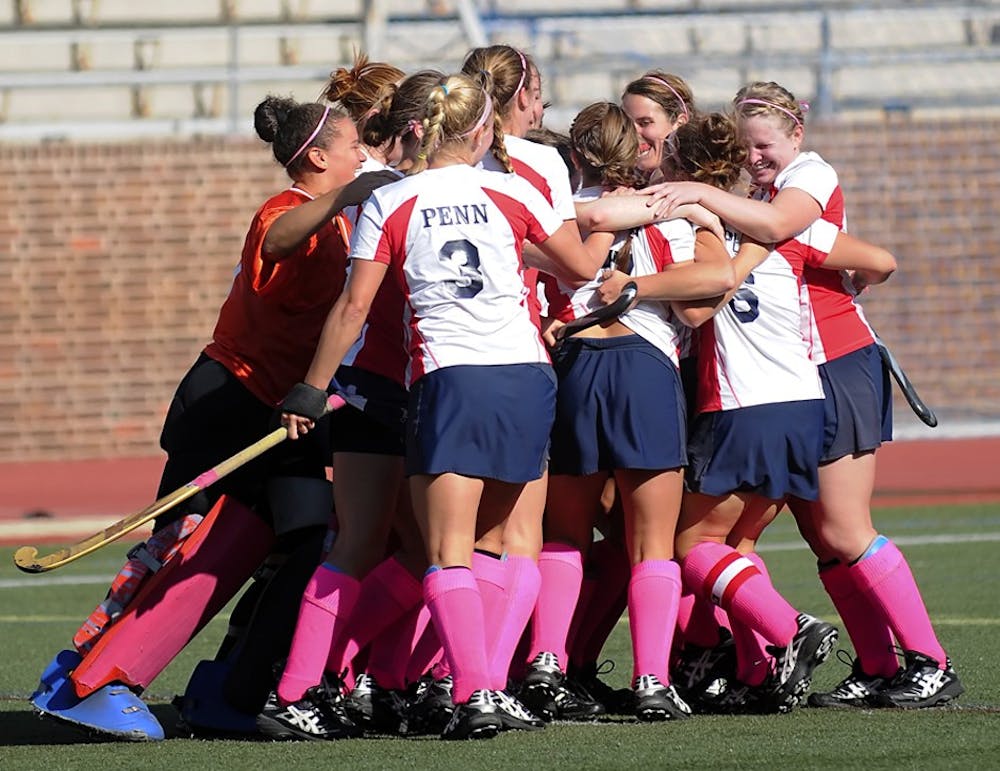For Penn field hockey, the 2010 season was one easily forgotten — a rebuilding year full of disappointment and low expectations.
Finishing with one of the worst records in program history (3-14, 1-6 Ivy) Penn had many extenuating circumstances to face: a new coach in her first season, a schedule featuring only five home games and a field that does not meet typical Division-I field hockey standards.
“Last season was definitely frustrating in that we didn’t find much success,” admitted Abigail Egan, a senior who was named co-captain for the 2011 squad. “But I think it was a great year in starting with a new coach and getting to know each other.”
Entering her second season, coach Colleen Fink believes last year, although difficult, was a necessary step in the direction of building a winning team.
“It was definitely a transitional type of year,” Fink said, “but from a hockey standpoint, we realized what we needed to try to bring in from a recruiting perspective … and what our vulnerabilities were.”
Being named head coach in April 2010, Fink did not have the advantage of a full offseason to recruit players and get to know the ones already on the roster, from neither a hockey nor a personal standpoint.
After a full offseason, Fink now knows what to expect, and things have gone “so much smoother.”
“I didn’t even know what NSO was last year,” she joked. “I have a much better handle on how Penn operates now.”
And on the recruiting front, Fink brought in a large class of eight freshmen.
In contrast to last season, this year the Quakers have the advantage of putting their young team on their home turf of Franklin Field for nine or their 17 games.
“When you have to travel a lot, it gets tiring,” senior co-captain Caroline Olt mused. “Home games are always fun — it’s nice to have your family and friends in the stands.”
Other than the typical benefits a home base will provide the team, the Quakers believe Franklin Field can provide them with another advantage, something that was more often than not a disadvantage last season.
“I think being on grass turf will benefit us a lot,” Egan said. “We get to practice on it every day, so we’re more used to it, whereas other teams have AstroTurf. So I think it’ll be a hard transition
for other teams coming to Penn.”
The majority of Division-I field hockey teams use the carpet-like AstroTurf, but Franklin Field’s surface is Sprinturf, which is much closer to grass. Most teams coming to Penn will not be used to playing games on this slower type of surface.
But when the Quakers travel to play a team with AstroTurf, they normally try to practice on Drexel’s field in the days leading up to the game, instead of on Franklin Field. Luckily for the Red and Blue, they will have to do that significantly less this season.
With fewer obstacles to climb, Penn’s 2011 squad looks poised for a much more successful season, backed by high expectations.
Fink expects a drastic improvement from her team this year, aiming to win at least half of the team’s Ivy League games. And she has done it before: in her previous head coaching post at Haverford College, each of her teams improved during her four years at the helm.
“We’ve made tons of progress since last season — from a hockey standpoint, from a culture standpoint and from an attitude standpoint,” Fink said.
As she finished discussing her team and made her way to practice, Fink pointed skyward and proclaimed that the team is on the ascent, and to “get on board now.”



